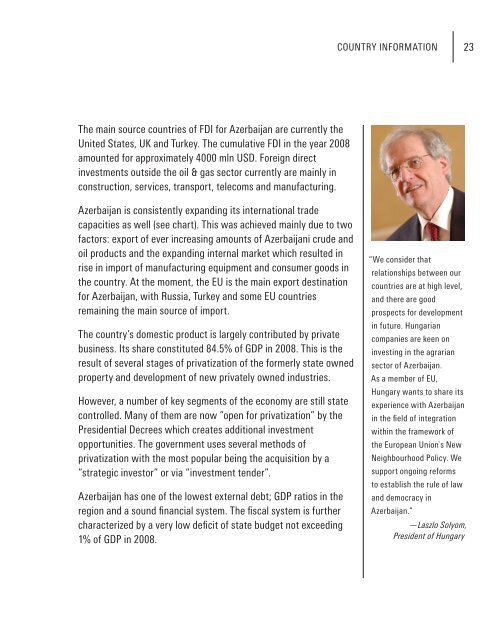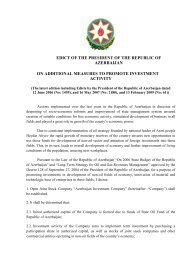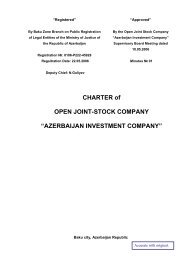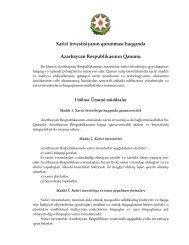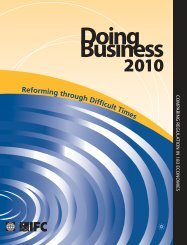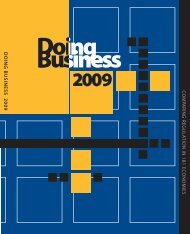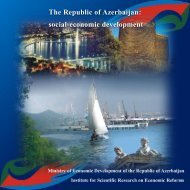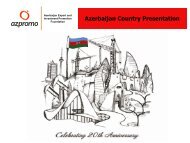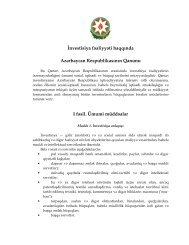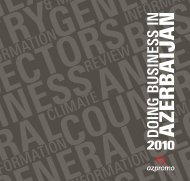Doing Business in Azerbaijan 2009 - Azerbaijan Export ...
Doing Business in Azerbaijan 2009 - Azerbaijan Export ...
Doing Business in Azerbaijan 2009 - Azerbaijan Export ...
Create successful ePaper yourself
Turn your PDF publications into a flip-book with our unique Google optimized e-Paper software.
The ma<strong>in</strong> source countries of FDI for <strong>Azerbaijan</strong> are currently the<br />
United States, UK and Turkey. The cumulative FDI <strong>in</strong> the year 2008<br />
amounted for approximately 4000 mln USD. Foreign direct<br />
<strong>in</strong>vestments outside the oil & gas sector currently are ma<strong>in</strong>ly <strong>in</strong><br />
construction, services, transport, telecoms and manufactur<strong>in</strong>g.<br />
<strong>Azerbaijan</strong> is consistently expand<strong>in</strong>g its <strong>in</strong>ternational trade<br />
capacities as well (see chart). This was achieved ma<strong>in</strong>ly due to two<br />
factors: export of ever <strong>in</strong>creas<strong>in</strong>g amounts of <strong>Azerbaijan</strong>i crude and<br />
oil products and the expand<strong>in</strong>g <strong>in</strong>ternal market which resulted <strong>in</strong><br />
rise <strong>in</strong> import of manufactur<strong>in</strong>g equipment and consumer goods <strong>in</strong><br />
the country. At the moment, the EU is the ma<strong>in</strong> export dest<strong>in</strong>ation<br />
for <strong>Azerbaijan</strong>, with Russia, Turkey and some EU countries<br />
rema<strong>in</strong><strong>in</strong>g the ma<strong>in</strong> source of import.<br />
The country’s domestic product is largely contributed by private<br />
bus<strong>in</strong>ess. Its share constituted 84.5% of GDP <strong>in</strong> 2008. This is the<br />
result of several stages of privatization of the formerly state owned<br />
property and development of new privately owned <strong>in</strong>dustries.<br />
However, a number of key segments of the economy are still state<br />
controlled. Many of them are now “open for privatization” by the<br />
Presidential Decrees which creates additional <strong>in</strong>vestment<br />
opportunities. The government uses several methods of<br />
privatization with the most popular be<strong>in</strong>g the acquisition by a<br />
“strategic <strong>in</strong>vestor” or via “<strong>in</strong>vestment tender”.<br />
<strong>Azerbaijan</strong> has one of the lowest external debt; GDP ratios <strong>in</strong> the<br />
region and a sound f<strong>in</strong>ancial system. The fiscal system is further<br />
characterized by a very low deficit of state budget not exceed<strong>in</strong>g<br />
1% of GDP <strong>in</strong> 2008.<br />
COUNTRY INFORMATION<br />
“We consider that<br />
relationships between our<br />
countries are at high level,<br />
and there are good<br />
prospects for development<br />
<strong>in</strong> future. Hungarian<br />
companies are keen on<br />
<strong>in</strong>vest<strong>in</strong>g <strong>in</strong> the agrarian<br />
sector of <strong>Azerbaijan</strong>.<br />
As a member of EU,<br />
Hungary wants to share its<br />
experience with <strong>Azerbaijan</strong><br />
<strong>in</strong> the field of <strong>in</strong>tegration<br />
with<strong>in</strong> the framework of<br />
the European Union`s New<br />
Neighbourhood Policy. We<br />
support ongo<strong>in</strong>g reforms<br />
to establish the rule of law<br />
and democracy <strong>in</strong><br />
<strong>Azerbaijan</strong>.”<br />
—Laszlo Solyom,<br />
President of Hungary<br />
23


